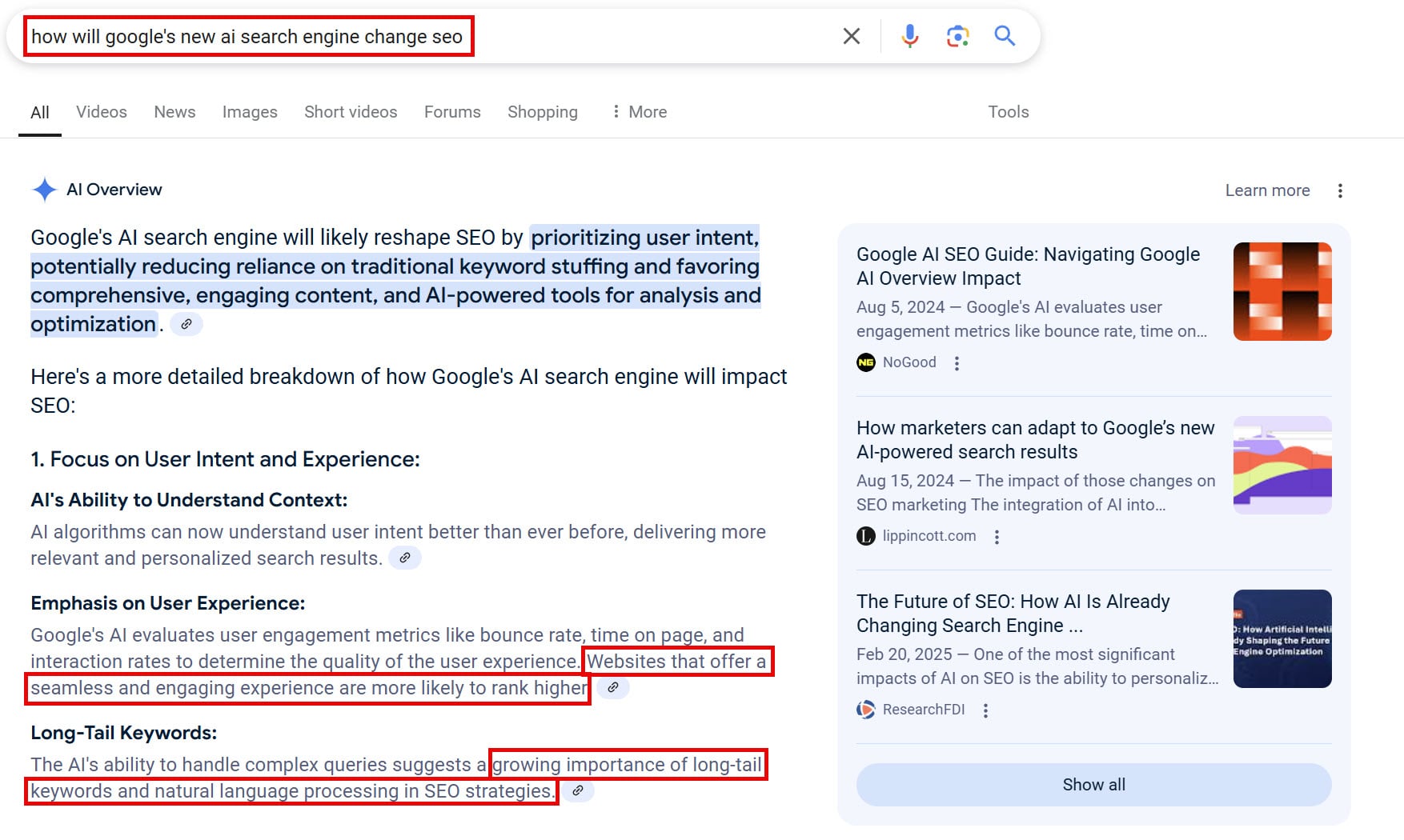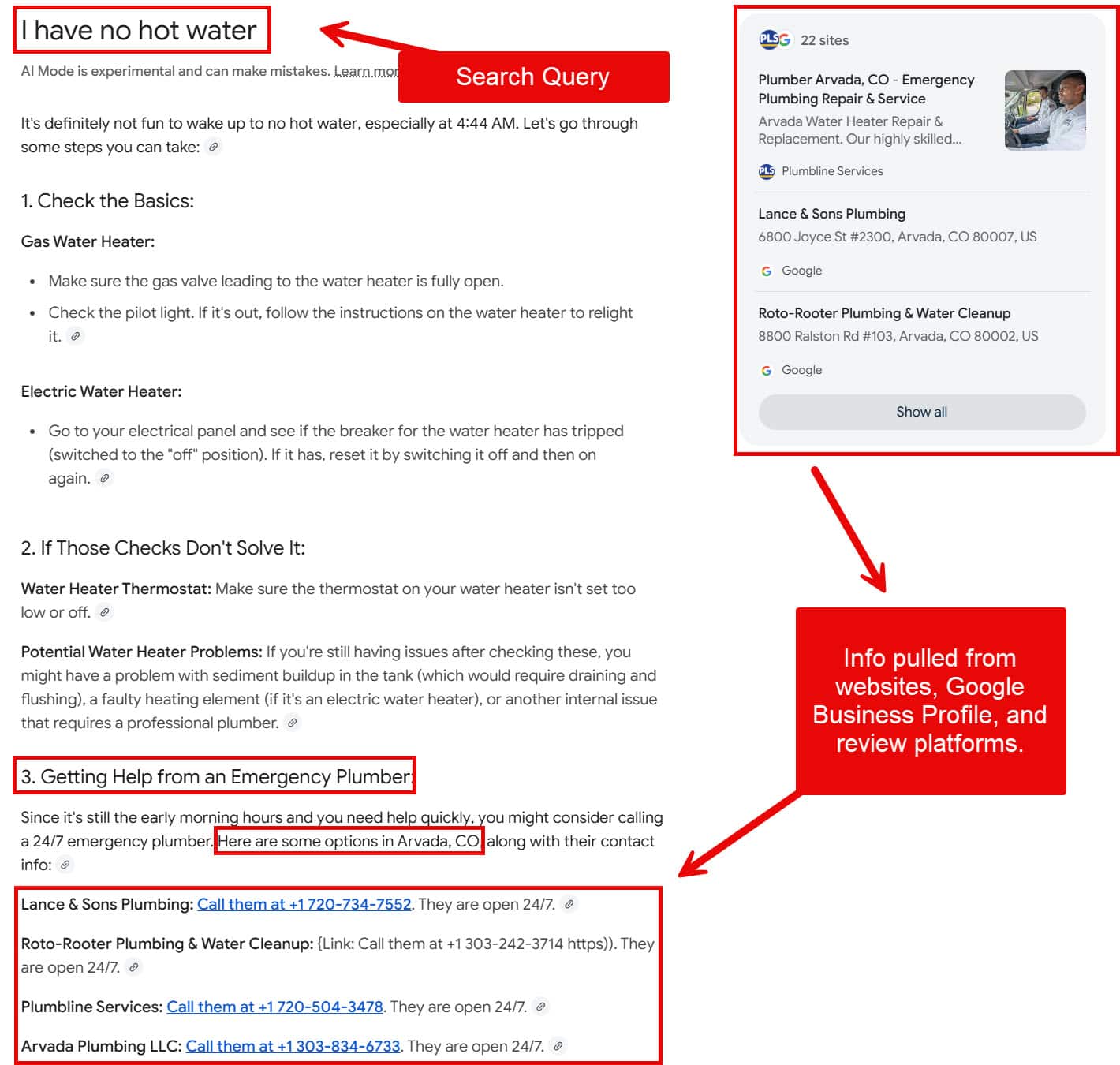
The digital marketing landscape is once again on the brink of a major shift, this time due to Google’s announcement of a new AI-powered search engine. This evolution is poised to redefine how SEO strategies are developed, implemented, and evaluated.
Nearly 60% of Google searches ended without a click in 2024 (Search Engine Land). As businesses and SEO professionals adapt to these changes, understanding the potential impacts of this new search engine technology is crucial as Google’s AI-driven approach is set to transform SEO practices.
The AI Revolution in Search
Understanding AI’s Role in Search Engines
Artificial Intelligence (AI) has been gradually integrated into various aspects of digital technology, and search engines are no exception. Google’s commitment to AI aims to make search results more relevant, personalized, and intuitive for users. This transition to AI-driven search processes means that algorithms are becoming more sophisticated, capable of understanding and predicting user intent in unprecedented ways.
The Shift to Natural Language Processing
At the heart of Google’s new AI search engine is advanced Natural Language Processing (NLP). This technology enhances the engine’s ability to comprehend the nuances of human language, making it possible for users to interact with Google in a more conversational manner. This shift emphasizes the importance of content that resonates with human readers rather than content that’s merely optimized for algorithms.
Google Revenue Breakdown
Google generates $32.78 billion a year in revenue from ads shown on network sites. These are largely sites running AdSense. Killing off their organic results will hurt their income by billions of dollars.
SEO in the Age of AI Search Engines
Content Quality Over Keywords

With the AI revolution, the focus shifts from traditional keyword stuffing to the creation of high-quality content. Google’s AI search engine prioritizes content that provides value, answers users’ questions, and offers an engaging user experience. This underscores the need for SEO strategies to evolve from keyword-centric approaches to one that values comprehensive, well-researched, and user-focused content.
The Importance of User Experience (UX)
The significance of user experience (UX) in SEO is magnified with the introduction of Google’s AI search engine. Websites that are intuitive, fast-loading, and mobile-friendly are more likely to be favored by AI algorithms. This means businesses will need to invest more in website design, responsiveness, and overall performance to ensure they meet these evolving standards.
Emphasis on Semantic Search
Semantic search refers to the ability of search engines to understand the context and intent behind users’ queries. With the advancement of AI, Google’s search engine is getting better at interpreting the nuances of language, meaning that content creators need to anticipate the intentions of their audience more accurately. This shift calls for a deeper understanding of target audiences and a more strategic approach to content creation.
Targeting Long-tail Phrases is Key
“Google’s improved search engine with AI will create a better experience for people using Google, which will cause Google’s overall traffic and usage to go up, which should help you continue to get a lot of traffic. It will start creating better results for long tail phrases. This should cause more people to search for long-tail phrases. This means the sites that rank organically or rank through paid ads, should generate more conversions.”
The Role of Structured Data
Structured data, or Schema markup, becomes even more crucial in an AI-driven SEO world. By helping search engines understand the context of content more effectively, structured data can improve visibility in search results. With Google’s new AI search engine, the proper use of structured data can enhance content discoverability and relevance, leading to better search performance.
How Google’s New AI Search Engine Will Change local SEO

1. Increased Importance of Google Business Profile (GBP) Optimization
- Your GBP acts as a critical signal to Google about your business’s relevance to local queries.
- Ensuring accurate and up-to-date information, including your hours, services, contact details, and relevant keywords within your profile, is crucial for appearing in AI-driven local searches.
2. Focus on Content Hyper-Relevance and User Intent
- Google’s AI is designed to better comprehend user queries and intent.
- Optimizing your content and SEO strategies to align with the evolving ways users search and seek information online is paramount.
- This involves creating high-quality, comprehensive content that directly addresses common user queries and matches searcher intent.
3. Potential Shift in Traditional Local Pack Rankings
- AI Overviews, providing summarized answers above traditional search results, may impact the click-through rate for those organic results, including the local pack.
- Focusing on strategies that get your business included in AI Overviews and cited within those summaries will be increasingly important.
4. Increased Emphasis on Customer Reviews
- AI can analyze customer sentiment and feedback to understand what customers like and dislike about your business.
- Responding to reviews, especially negative ones, in a way that enhances your local SEO performance can be automated with AI-driven tools.
5. Importance of Voice Search Optimization
- Voice search is increasingly popular, and AI is at the core of understanding these conversational queries.
- Focus on natural, conversational keywords and phrases in your content and SEO strategy to cater to voice searches.
6. Leveraging AI-Powered Tools for Local SEO
- AI-powered tools can automate tasks like keyword research, GBP optimization, and content creation.
- They can also help with competitor analysis, identifying opportunities and suggesting improvements to your local SEO strategy.
Adapting to the New SEO Landscape
Continuous Learning and Adaptation
The introduction of AI into Google’s search engine signals a need for continuous learning and adaptation among SEO professionals. Staying informed about the latest algorithm updates and understanding AI’s implications on search will be key to crafting effective SEO strategies.
Collaborating with AI for Success
Instead of viewing AI as a challenge to SEO, professionals should see it as an opportunity to enhance their strategies. By leveraging AI tools for keyword research, content optimization, and analytics, SEO practitioners can align their efforts more closely with the capabilities of the new search engine.
A More Strategic SEO Approach
With the transition to AI, SEO becomes less about exploiting algorithmic loopholes and more about strategic planning. This entails a comprehensive understanding of one’s audience, the competitive landscape, and the technological advancements in search engines. A strategic approach focused on quality and user satisfaction is bound to be more successful in the long run.
Conclusion
Google’s new AI search engine represents a significant evolution in how search works and, by extension, how SEO should be approached. As we move forward, the keys to success in this new era will involve embracing quality content, prioritizing user experience, understanding the nuances of semantic search, and leveraging structured data. As the landscape changes, businesses and SEO professionals who adapt quickly and strategically will be best positioned to thrive. This is also why we advise our clients to focus on an omnichannel approach (SEO, paid ads, social media, email marketing, content marketing, etc.) In essence, they leverage all the channels that can help them grow instead of just one.
Ready to turn your website and online presence into your best salesperson? Contact us for a free digital marketing audit and strategy session.

About the Author
Katie Wilson, Owner
Aspire ID is a small digital marketing company in Denver, Colorado. Our mission is to empower business growth through superior digital marketing solutions and to build long-lasting client relationships. Since 2002, Katie and her team have helped home service businesses throughout the U.S. consistently grow and generate leads by providing best-in-class web design, SEO, PPC, content marketing, social media management, and reputation management and deploying targeted online marketing strategies driven by clear objectives.






